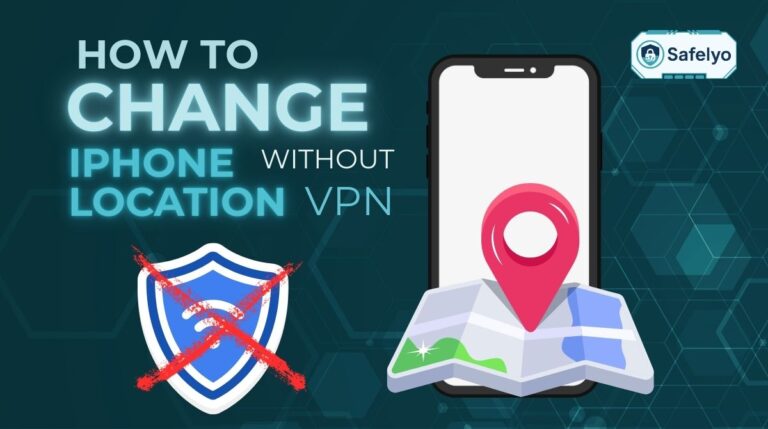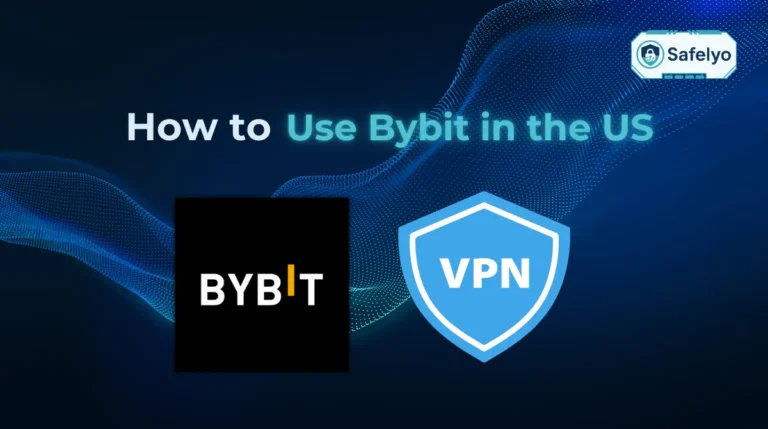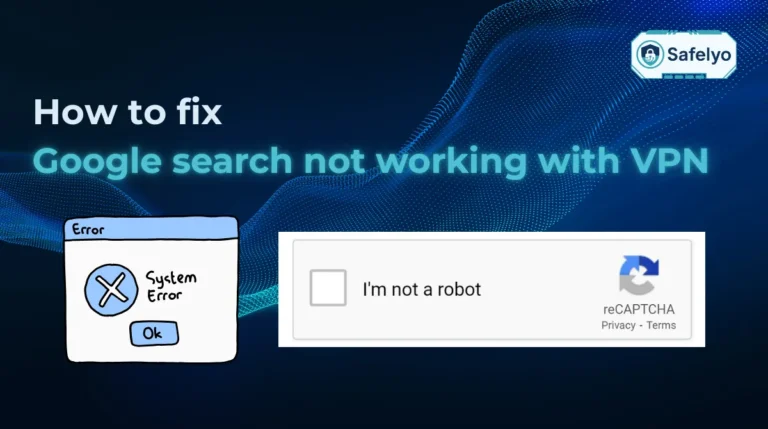Picture this: You’re settled into your campsite at KOA, the campfire is crackling, and you’re ready to stream a movie or catch up on work emails. The first question that pops into your head is probably, does KOA allow VPN access? The simple answer is yes, absolutely. But getting a stable and truly secure connection isn’t always as straightforward as just flipping a switch.
In today’s digital world, connecting to any public Wi-Fi network without protection is like leaving your RV door wide open. A virtual private network (VPN) isn’t just a tech tool for experts; it’s your first and most critical line of defense when you’re on the road.
With years of testing cybersecurity tools in real-world travel scenarios, from busy airports to remote campgrounds, I’ve seen firsthand how a simple VPN can be the difference between a relaxing trip and a data security nightmare. It’s an essential tool for any modern traveler.
In this comprehensive guide, we’ll walk you through:
- Why using a VPN on KOA Wi-Fi is non-negotiable.
- The exact steps to take if your VPN connection seems blocked.
- Our top picks for the best, road-tested VPNs that actually work at campgrounds.
Don’t let a spotty or insecure connection spoil your adventure. Let Safelyo help you build a digital fortress for your travels, starting right now.
1. So, does KOA allow VPN access? The direct answer
Let’s get straight to the point. Yes, KOA campgrounds generally allow you to use a VPN. There is no official KOA policy that bans or prohibits VPN access. If you’ve ever had trouble connecting, it’s almost certainly not because you were “banned,” but because of a technical hurdle with the campground’s specific network setup. We’ll show you how to solve that in a moment.
More importantly, you shouldn’t just ask if it’s allowed; you should see it as a necessity. Using a VPN is an essential step for protecting your sensitive information, like banking details, passwords, and private messages, on an open network.
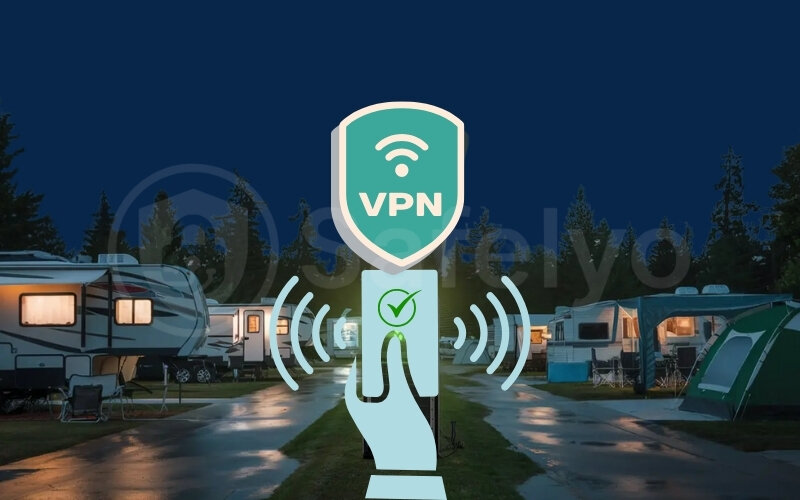
I always advise users to treat every public Wi-Fi network as a potentially hostile environment. Whether you’re at a coffee shop, an airport, or a beautiful KOA campground, your VPN is the single most important tool for keeping your digital life private and secure.
>> You may also be interested in:
2. Why a VPN is non-negotiable for KOA Wi-Fi security
As someone who frequently works and travels on the road, I’ve learned one rule the hard way: Never fully trust free public Wi-Fi. That complimentary KOA connection is a fantastic perk, but it comes with hidden risks. Let’s break down exactly why a VPN isn’t just a “nice-to-have” but an absolute essential I never travel without.
2.1. Shielding your data from hackers on public networks
Public Wi-Fi networks are inherently open. So, “Can VPN be hacked?” – YES! Think of it like a public square where conversations can be easily overheard. On these networks, it’s shockingly simple for someone with basic tools to launch a “man-in-the-middle” attack and spy on what you’re doing.
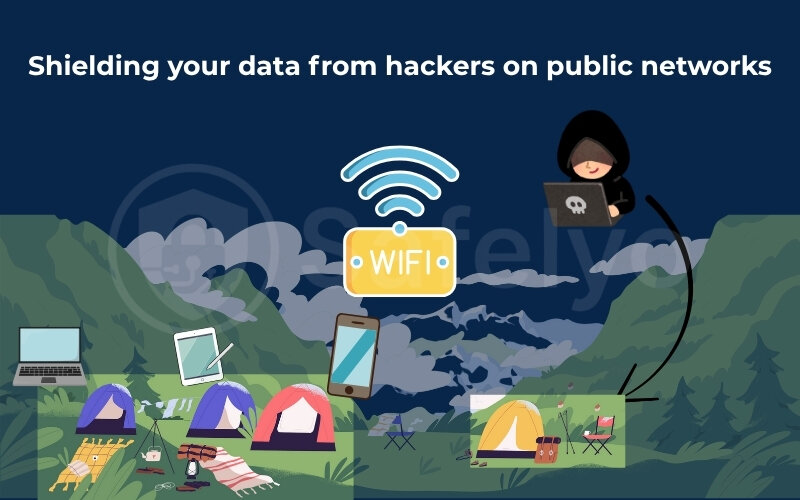
Here’s a simple, real-world example: Imagine you’re at your campsite and decide to buy something on Amazon. Without a VPN, a tech-savvy person in the RV next door could potentially see the data you’re sending, including your login information. I’ve personally run network-sniffing tools on public Wi-Fi (for testing purposes, of course!) and was horrified at how much unencrypted data is flying through the air.
A VPN creates a private, encrypted VPN tunnel for your internet traffic. It essentially makes your data invisible and unreadable to anyone else on the network.
2.2. Bypassing internet throttling for better speeds
I’ve lost count of how many times I’ve settled in after a long day of hiking, ready to stream a show, only to have it buffer endlessly. This is often “internet throttling,” where the network intentionally slows you down during peak hours, especially for video.
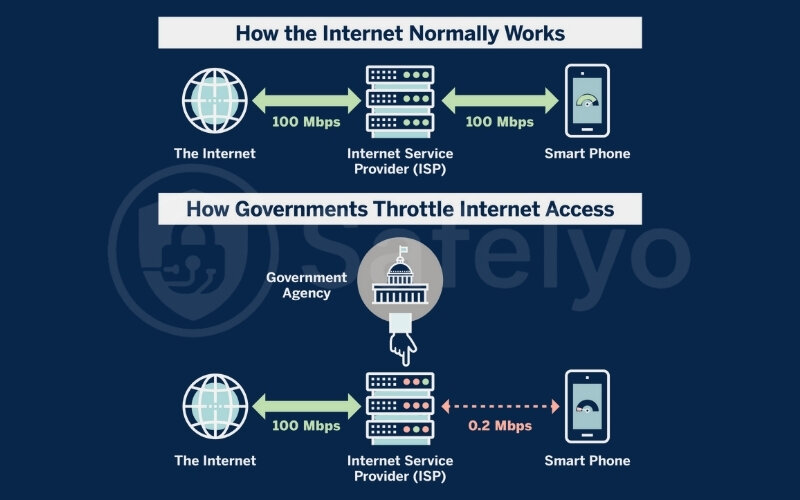
It’s a frustrating but common experience for campers. The campground’s network sees you’re using a lot of data for streaming and puts the brakes on your connection to save bandwidth for others. A VPN is my secret weapon against this. Because a VPN encrypts your activity, the network can’t tell if you’re streaming a 4K movie or just checking email. It’s a trick I use all the time to maintain a smoother, more consistent streaming speed.
2.3. Unlocking your favorite shows and services from anywhere
This one is a big deal for me personally. A few months ago, I was camping in Utah and wanted to watch my hometown baseball team’s game, but my streaming app said it was blacked out in that region. This is called a geo-restriction.
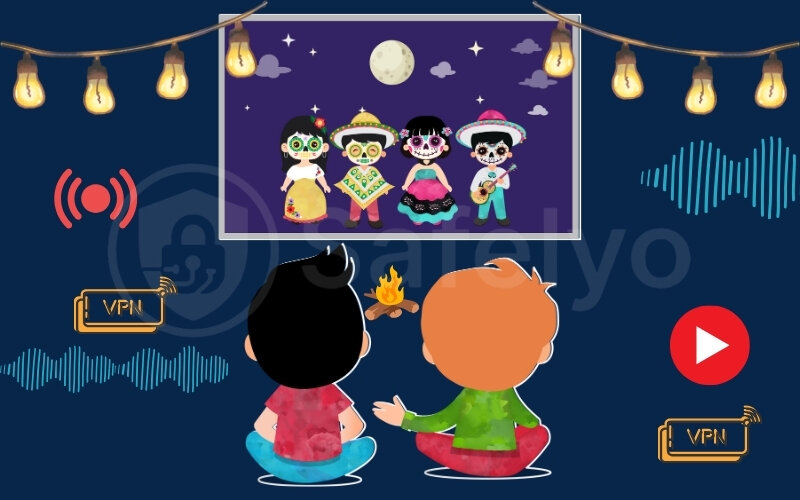
Instead of missing the game, I simply opened my VPN app, connected to a server back in my home city of Chicago, and refreshed the page. Instantly, the game started playing as if I were sitting on my own couch. A VPN lets you digitally “teleport” your connection to almost anywhere, giving you access to the local news, sports, and streaming libraries you pay for, no matter where your RV is parked.
3. What to do if KOA seems to be blocking your VPN
So, you’ve fired up your trusty VPN, hit ‘connect,’ and… nothing. You’re met with a frustrating, endless loading wheel. It’s a common scenario, and your first thought might be that KOA is actively blocking you.
In my experience, it’s rarely a personal block. The issue is almost always a technical one with how the campground’s network is configured. The good news is that there are proven ways to get around it. First, let’s understand what’s happening behind the scenes.
3.1. Understanding the technical reasons for a failed connection
When your VPN fails to connect, it’s usually due to one of these three reasons, which I’ve explained in simple terms:
- Port blocking: Think of the internet connection as a building with thousands of doors, or “ports.” Most web traffic uses a standard front door (Port 443). Some VPN protocols try to use different side doors. If the KOA network has locked these side doors for security, your VPN can’t get in.
- Deep packet inspection (DPI): This is a more advanced network security measure. Imagine a mailroom security guard who doesn’t just check the address on your packages (your data) but also analyzes the shape and size of the box to guess what’s inside. DPI can detect the “shape” of VPN traffic, even if it’s encrypted, and block it.
- IP blacklisting: This is the simplest one. The specific VPN server you’re trying to connect to has an address (an IP address) that the network has flagged as suspicious or has simply blocked. It’s like the network has blocked that server’s phone number.
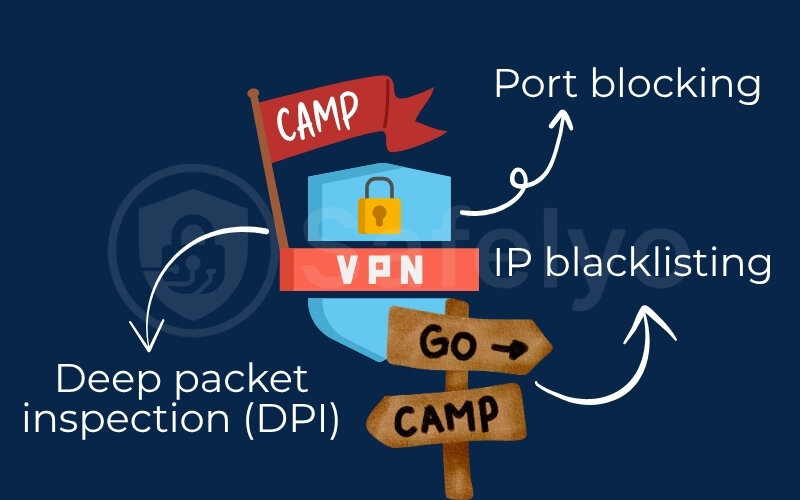
3.2. Your step-by-step troubleshooting guide
Now for the solutions. When I run into a stubborn network, I follow this exact troubleshooting checklist. Start with step one and move down the list.
Quick fix checklist:
- Change Protocol: Switch to OpenVPN (TCP) in your app settings.
- Enable Stealth Mode: Turn on “Obfuscated Servers” or “Camouflage Mode”.
- Switch Server: Connect to a different server location.
- Use Hotspot: As a last resort, use your phone’s mobile hotspot.
Step 1: Switch VPN protocols.
This is your first and most effective move. Go into your VPN app’s settings and look for the connection protocol options. Switch it to OpenVPN (TCP). This protocol is designed to use Port 443, the same “door” used by secure websites like your bank. Because it mimics regular, secure web traffic, it’s very difficult for a network to block.
Step 2: Enable obfuscation or stealth mode.
If changing protocols doesn’t work, the network is likely using DPI. Your secret weapon here is a feature called “obfuscation.” This feature disguises your VPN traffic to look like normal internet traffic, making it invisible to DPI. Different VPNs have different names for it. In NordVPN, you’ll look for “Obfuscated Servers.” In Surfshark, it’s called “Camouflage Mode.” This is my go-to move for the toughest networks.
Step 3: Connect to a different server.
Sometimes the fix is as simple as this. The server you first connected to might be overcrowded, or its IP address VPN might be on a blacklist. Go back to your VPN’s server list and pick another one in the same city or state. Often, this is all it takes to get a successful connection.
Step 4: Use your phone's hotspot.
If all else fails and you absolutely need a secure connection, this is your final fallback. Turn on your phone’s mobile hotspot and connect your laptop to it. This uses your cellular data plan, but it creates a private network that won’t have the same restrictions as the campground’s Wi-Fi.
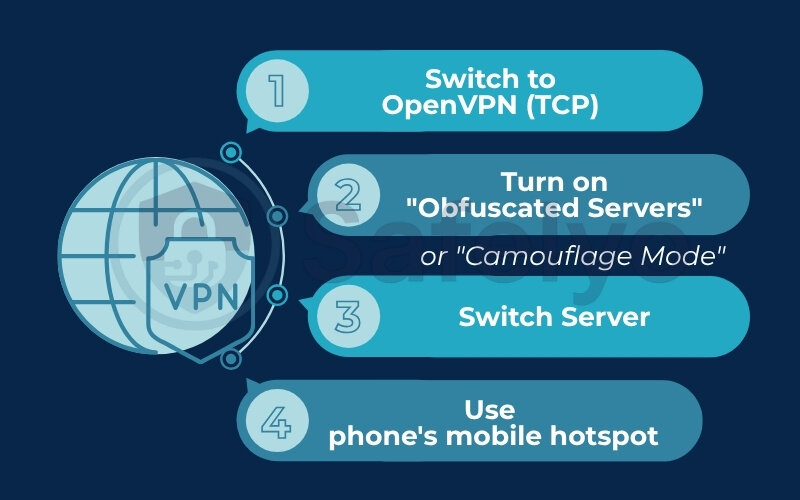
4. The 3 best VPNs for KOA campgrounds and RV travel
Not all VPNs are created equal, especially when you’re dealing with the unpredictable nature of public Wi-Fi. After testing dozens of services on the road, I’ve found that the best VPN for camping and RV travel needs a specific set of features. You need strong obfuscation to bypass blocks, excellent speeds for streaming, a wide network of US-based servers, and an app that’s easy to use when you just want to relax.
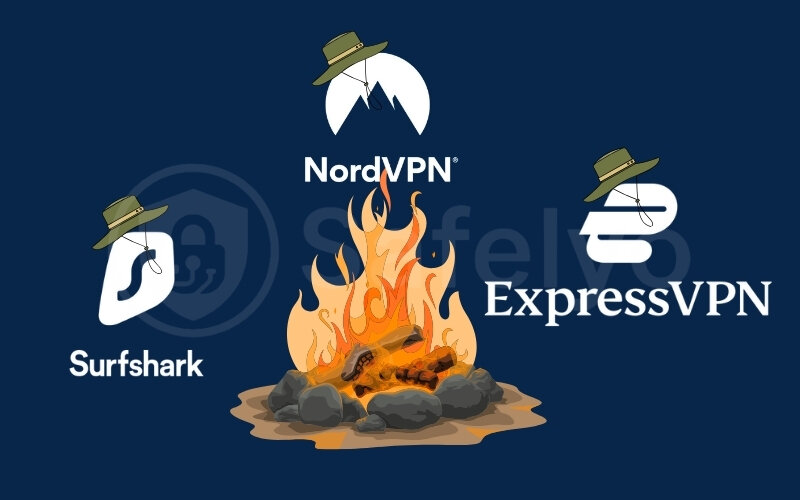
Based on these criteria, here are the top 3 VPNs that have consistently performed the best for me at campgrounds across the country.
Safelyo Scorecard
Top VPNs for Campers
| Feature | NordVPN | Surfshark | ExpressVPN |
|---|---|---|---|
| Bypassing blocks (Obfuscation) | 9.8/10 | 9.5/10 | 9.2/10 |
| Speed for streaming | 9.5/10 | 9.0/10 | 9.3/10 |
| Ease of use for travelers | 9.2/10 | 9.5/10 | 9.8/10 |
| Device connections | 10 | Unlimited | 8 |
| Overall Safelyo score | 9.6/10 | 9.4/10 | 9.4/10 |
NordVPN earns our “Safelyo’s Choice” badge for its unmatched ability to bypass restrictive networks.
4.1. NordVPN: The best all-rounder for bypassing blocks
If I had to choose just one VPN for all my travels, it would be NordVPN. Its main advantage for campers is its dedicated “Obfuscated Servers.” This is the feature I turn to first when a network is giving me trouble, and it has worked for me in nearly every situation. You just select it from the specialty server list, and it handles the rest. Beyond that, its NordLynx protocol delivers some of the fastest speeds in the industry, which is perfect for buffer-free streaming after a long day.
During my last KOA stay in Texas Hill Country, I streamed NFL Sunday Ticket flawlessly using NordVPN’s obfuscated servers, despite campground Wi-Fi restrictions.
>> For a complete breakdown of its speeds and security features, check out our full NordVPN review.
4.2. Surfshark: Best value for unlimited devices
Surfshark is an incredible value, especially for families or anyone traveling with a lot of gadgets. Its standout feature is its unlimited device connections policy. This means you can secure your laptop, your partner’s phone, and the kids’ tablets all on a single, affordable subscription. For bypassing blocks, it’s “Camouflage Mode” activates automatically when you use the OpenVPN protocol, making it super easy to use. It’s a reliable and budget-friendly workhorse.
>> To see why it offers the best bang for your buck, read our comprehensive Surfshark review.
4.3. ExpressVPN: Easiest to use with excellent speeds
For travelers who value simplicity above all else, ExpressVPN is a top contender. Its app is clean, intuitive, and incredibly easy to use – you’re usually just one click away from a secure connection. While it doesn’t have a manual toggle for obfuscation, its stealth technology is built in and activates automatically whenever it detects a restrictive network. In my tests, it has proven very effective. It also delivers consistently fast and stable speeds, making it a premium, hassle-free choice for streaming and browsing at the campsite.
>> For a closer look at its minimalist app and impressive streaming performance, explore our full ExpressVPN review.
5. Your KOA trip VPN checklist
Before you hit the road, run through this quick checklist to ensure you’re ready for any network situation.
| Your KOA Trip VPN Checklist | |
| ✔ | Install and log into your chosen VPN app before you leave home. |
| ✔ | Know how to switch protocols (your go-to is OpenVPN TCP). |
| ✔ | Locate the “obfuscated” or “stealth” server option in your app. |
| ✔ | Download a few favorite shows offline, just in case. |
| ✔ | Save this Safelyo guide for easy troubleshooting on the road! |
6. FAQ about VPN at KOA
Here are some of the most common questions campers have about using a VPN at KOA.
Does using a VPN at KOA significantly slow down my internet speed?
All VPNs will cause a slight speed reduction due to encryption, but with a premium VPN like the ones we recommend, the difference is often unnoticeable for browsing and streaming. In many cases, the KOA wi-fi itself is the main bottleneck for speed, not the VPN.
Is it safe to use public wi-fi at KOA without a vpn?
It is not recommended. Public wi-fi networks are inherently insecure, making your personal data vulnerable to theft. Safelyo strongly advises always using a VPN on any public network, no exceptions.
Can I use a free VPN on KOA wi-fi?
While technically possible, free VPNs are a poor choice. They often have slow speeds, strict data limits, few server options, and may even sell your data to third parties, completely defeating the purpose of using a VPN for privacy.
What’s the difference between KOA Journey, KOA Holiday, and KOA Resort Wi-Fi?
While the amenities differ between these KOA types, the underlying wi-fi security risks are the same. From a security standpoint, they are all public networks. You should use a VPN regardless of which type of KOA campground you are staying at.
7. Conclusion
So, the question of “does KOA allow VPN access?” is settled. The answer is a clear yes, but more importantly, using a VPN is an essential safety measure for any modern camper. It’s the key to transforming a risky public connection into a secure, private online experience.
To recap, here are the key things to remember for your next trip:
- A VPN protects your data from hackers and snoops on open wi-fi networks.
- It can help you bypass frustrating internet throttling and geo-restrictions for better streaming.
- If you can’t connect, your first steps should be switching to the OpenVPN (TCP) protocol or enabling obfuscation.
Don’t trade your digital security for a bit of convenience. Investing in a quality VPN is a small price to pay for total peace of mind during your adventures. At Safelyo, we’re dedicated to making cybersecurity simple and accessible for everyone. To learn more about essential security tools and read our in-depth reviews, explore our Privacy & Security Basics category today.

